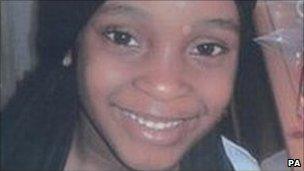Starved girl Khyra Ishaq's death 'was preventable'
- Published

Khyra Ishaq starved to death in 2008
The death of a seven-year-old girl who starved to death could have been prevented, a report has found.
Khyra Ishaq was mistreated by her mother and her partner at a house in Handsworth, Birmingham, and weighed just 2st 9lb (16.5kg) when found.
The Serious Case Review into her death found there were a catalogue of missed opportunities by professional agencies.
It also said better assessments and more effective communication could have stopped her death in 2008.
Birmingham Safeguarding Children Board (BSCB)'s 180 page Serious Case Review, external is the first of its kind to be published in full.
Some professionals "lost sight" of their responsibilities to protect Khyra, who succumbed to an infection after months of starvation and cruelty, and instead focused on the rights of the girl's mother and her partner, the review found.
It pointed to a severe lack of communication between her school, social workers and other agencies dating back to March 2006.
The review found social workers did not listen to school staff members' concerns about Khyra, and contact by two worried members of the public was not acted on.
Tony Howell, head of children's services, said the report found two fundamental failings that occur through a huge range of services.
"One is the inability on occasion for them to follow their own procedures so they don't complete the task that needs to be done," he said.
The second one is communication between departments and agencies, he said.
"I think one of the issues that we have to be honest about (is that) all the agencies and indeed the safeguarding board's view is that we did fail Khyra in this case," he said.
Head of children's services at Birmingham City Council Tony Howell: "We did fail Khyra in this case"
"We will do everything we can to see our safeguarding procedures are better in future," he added.
Education Secretary Michael Gove said: "It is beyond anyone's comprehension that a child could die under such tragic circumstances.
"Today's serious case review confirms that all the agencies in Birmingham failed to protect this vulnerable child."
The seven-year-old's mother Angela Gordon, 35, and her partner Junaid Abuhamza, 31, were jailed earlier this year after they admitted Khyra's manslaughter.
Khyra and five other children in the couple's care were deprived of food and prevented from entering the fully-stocked kitchen by a bolt on the door.
Khyra was taken out of school by Gordon in December 2007 and concerns were raised about home education in the report.
Mr Gove said local authorities needed to develop "positive relationships" with their home-educating community.
"Clearly lessons need to be learned by the tragic events in this case, and I will consider the letter I expect to receive from Birmingham shortly, to see what changes need to be made to the existing arrangements, and reply in due course."

Gordon and Abuhamza are appealing against their sentences
Birmingham City Council confirmed three staff directly involved in the Khyra Ishaq case have been removed from front-line duties and said it had "already acted" on most of the report's recommendations.
Hilary Thompson, BSCB chairwoman, said: "The serious case review concludes that although the scale of the abuse inflicted would have been hard to predict, Khyra's death was preventable.
"The report identifies missed opportunities, highlighting that better assessment and information-sharing by key organisations could have resulted in a different outcome."
It said three incidents in March 2006 were not progressed "either by failures of paperwork to reach the correct departments, failure to follow safeguarding procedures, or to conduct thorough checks prior to case closure".
The report also highlighted a "major safeguarding flaw" within home education legislation in relation to her death.
It said: "The situation is particularly advantageous for parents who may wish to conceal abuse."
A complaint made by Gordon against a social worker who visited their Handsworth home "generated a reluctance" to complete an assessment, the BSCB said.
It continued: "Whilst a number of agencies and individuals sought to deliver effective services to the child... there were others who lost sight of the child and focused instead upon the rights of the adults, the adults' behaviours and the potential impact for themselves as professionals."
School medical staff were criticised for not adequately addressing concerns by school staff.
The report made 18 recommendations for specific action across groups including the city council, the safeguarding board, West Midlands Police and the city's primary care trusts.
A further 53 areas for improvement were identified.
Recommendations included that school height and weight checks should be properly recorded and that social care must review its screening process.
Mr Howell said children's social care had undergone a major review and the management team had been strengthened.
Khyra's father, Ishaq Abuzaire: "I hope that Khyra's death is not in vain"
Les Lawrence, cabinet member for children, young people and families, said the council re-affirmed its commitment to "create a children's social care service that better protects our young people from those who would harm them".
"Let this be Khyra's legacy," he added.
A joint health statement from the city's primary health trusts said they had made good progress at implementing recommendations made by the report.
Meanwhile, West Midlands Police said one of the recommendations directly related to the force and this had been addressed.
"Over the course of the last 12 months a new public protection department has been created," a spokesman said.
Gordon was sentenced to 15 years and Abuhamza was jailed indefinitely for the public's protection, with a minimum term of seven-and-a-half years.
They have been given the go-ahead to appeal against their sentences.
- Published27 July 2010
- Published27 July 2010
- Published27 July 2010
- Published20 July 2010